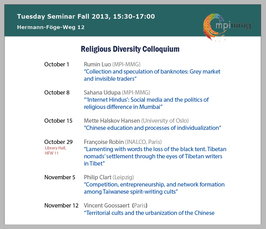"Immigrant religious communities in Switzerland – Bridges or Impediment for Social Incorporation?"
Religious Diversity Colloquium Winter 2013/14
- Datum: 19.11.2013
- Uhrzeit: 15:30 - 17:00
- Vortragender: Martin Baumann (University of Lucerne, Switzerland)
- Martin Baumann is Professor of the Study of Religions at the Faculty for Humanities and Social Sciences and current vice-chancellor for the advancement of research at the University of Lucerne in Switzerland. He obtained his Ph.D. with a thesis on Buddhists and Buddhist communities in Germany in 1993 at the University of Hannover (Germany) and received his habilitation graduation with a post-doctoral thesis on Hindu tradition in diasporic contexts in 1999 at the University of Leipzig (Germany). Since 2001, he is professor for the Study of Religions at the University of Lucerne (Switzerland). His teaching and research interests focus on immigration and religion, diaspora communities and religious pluralism, new religions, and Hindu and Buddhist traditions in the West.
- Ort: MPI-MMG, Hermann-Föge-Weg 12, Göttingen
- Raum: Conference Room

For more details please contact vdvoffice(at)mmg.mpg.de.
Immigrant religious communities in Switzerland and generally in Western Europe do not only maintain and continue religious and cultural traditions. Rather, as new research findings from Switzerland underscore, immigrant communities more often than not function as bridges for successful incorporation of immigrants and their adolescence in the local society. The paper scrutinizes the different roles of immigrant religious communities along the “three Rs” of refuge, respectability and resources suggested by Charles Hirschman (2004). Local religious communities such as mosques, churches, temples, and pagodas offer initial points of contact for refugees and newly arrived migrants; they provide spaces for its leader to gain respectability within the commu-nities and local society; and they offer a variety of resources such as counselling, language classes, cultural and sportive activities, and much more. The paper argues that beyond the primary religious and cultic responsibilities, immigrant religious communities actively engage in forms of local civic engagement for their people. Taking the argument a step further, the paper moves beyond a mere functional lumping together of religions and pays close attention to the differences and distinctive-ness of various religions and religious communities. A heuristic moral order map developed by Fred Kniss and Paul Numrich (2007) is applied to exemplary immigrant religious communities in Switzerland in order to highlight differences of religious groups in their perspective towards the larger society.